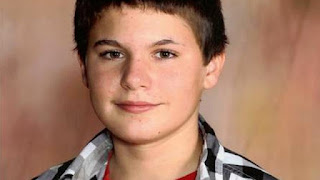Surely, the list of who is against child molestation also includes the broad majority of society that also finds these similar acts reprehensible (although not to the mob- mental destructive fervor they reserve for child molestation), but hatred makes strange bedfellows of them nonetheless. Blinding hatred is just that, blinding, because it stops a person from being able to discern what is moral and just, even when guided by one's own intuition. We start to over-sing the psalms of damnation upon one propped-up source of mob-mental aggression, the "child molester," only to ignore other forms of abuse just as objectively destructive. It is as if we've been blinded by the lightning shot which crackles one by the hour, and have forgotten about the billions of raindrops. We'd let our children freeze to death in that rain by the hundreds before we eased our horror that even one may be struck by a random bolt. Truly, there's more to being a good person than simply hating on that which is demonstrably vile (as the vigilantes do).
To be a good person in this sense, you actually have to not cause harm to any child by intention, and if necessary (in some "life or death" situation), only with the pain of regret guiding your hand. This not only includes child molestation, but all those more socially acceptable means adults have invented over the millenia to abuse children into submission. The many who don't routinely abuse children under the guise of discipline, who don't spoil children into dependence, or give the order to put young people into harm's way for someone else's gain--those are the unsung heroes. If society can permit anyone who simply hates on child molestation to claim to title of "hero," and then orchestrate songs of praise for their good intentions, imagine how society ought to treat the broader majority of people who don't just have good intentions but put them into practice for the good of others. If such were the case, these heroes would no longer be unsung.
However, western culture (Babylon) continues to fetishize the perverse anyways, despite all the good intentions in the world. This is how a man can hold up a convenience store or cause an accident in a high speed chase and gain not only news headlines but even highlights on television clip shows, but the good act of charity that some other man participated in will never be given any spotlight in anyone's mind. If an action is not spotlighted in the mind by culture (whether it's right or wrong), then it is almost always more right, more just, and more decent by its sense of genuine earnestness than any flimsy public moralistic spectacle could ever be. Moral spectacle is merely pretense laying on a bed of perverse fetishism. The more virulently popularized that moralistic spectacle is, the more justified its unsung, unnoticed, cousin act becomes. For example, parents shouldn't consider themselves good people because they hate and fear child molestation, or any other heinous act, as everyone else, but rather, by whether or not they read to their child before telling them to get some sleep. And even if one isn't a parent, one could almost justifiably judge themselves along the same criterion.
Sure, the act of reading to a child is not going to win you an award, nor is it going to bestow on you the mantle of "Protector of Children" (as many of the anti-pedo vigilantes covet), but you will have done right by a child in doing so, in almost all cases. The only song you will ever have played in your life will be sung from the souls of the individuals you nurtured and gave your love and time to. That, to me, is a more justifiable vindication than this more "culturally-accessible fear and hate mongering" will ever be, concerning the worst among us--the very thing that, though so attractive to our sentiments, becomes the most vile thing of all.
Sure, the act of reading to a child is not going to win you an award, nor is it going to bestow on you the mantle of "Protector of Children" (as many of the anti-pedo vigilantes covet), but you will have done right by a child in doing so, in almost all cases. The only song you will ever have played in your life will be sung from the souls of the individuals you nurtured and gave your love and time to. That, to me, is a more justifiable vindication than this more "culturally-accessible fear and hate mongering" will ever be, concerning the worst among us--the very thing that, though so attractive to our sentiments, becomes the most vile thing of all.


